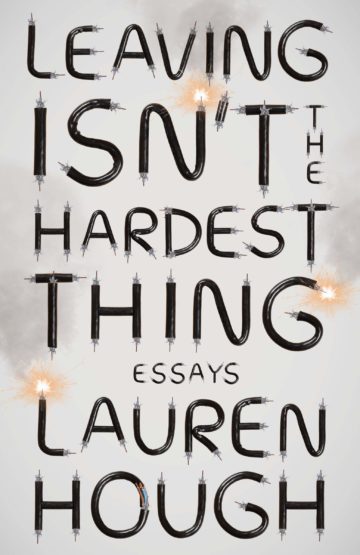When Lauren Hough was 37, she sold her house, all the stuff in it, bought a Winnebago, and left Maryland, heading west with an iPod full of John Denver. Her debut essay collection, Leaving Isn’t the Hardest Thing, is about finding the strength to pack your bags and give the finger to the places and people who tried their damnedest to diminish you. Driving away isn’t hard but, as Hough can attest, rebuilding your life is—especially when past traumas rise out of memory’s dirt like the undead.
In terms of a place to call home, Hough belongs everywhere and nowhere. Raised in a cult called the Children of God, later shortened to the Family, she grew up a cross-continental tumbleweed. Born in Berlin in 1977, her family followed the whims of the cult’s founder, David Berg, as he moved to Chile, Argentina, Japan, and Switzerland. With a grandmother in West Texas, she bounced in and out of Amarillo. Her parents divorced, left the cult, returned, then left again. “A cult,” Hough writes, “is your textbook abusive relationship—love-bomb, isolate, create dependence, and your victim won’t have the power to leave.”
Hough slept in rooms crowded with kids and learned how to hold a baby in one arm while changing the diaper of another. When cult elders—called shepherds—noticed that she wasn’t “feminine” enough, they had her reread The Look of Love, a text that taught girls how to properly flirt with men. When she didn’t cross her ankles correctly, her stepfather, Gabe beat her. She took revenge by switching the bed-sharing schedule, so he’d be assigned to sleep with “women he loathed.”

At 15, Hough ended up back in West Texas. Raised on Family propaganda, where school meant reading the bible and “half listening to our shepherd explain why God made it possible for girls to have babies at twelve,” adapting was hard. For the first few years, she and her brother, Mikey were homeschooled. They watched MTV and studied how to be Americans by reading People magazine and testing each other on key facts about celebrities like Julia Roberts, a class they called “humanities.” In one of the most telling scenes, the siblings sit on a rooftop, daydreaming what their adult lives might look like. Her brother wants to be an artist. She wants to be a writer, maybe a reporter. Her brother shrugs and predicts they’ll probably both end up bartenders. When you’re born working class, Hough notes, you sense “[t]here’s a world of opportunity you’ll never reach.”
In the late ‘90s, when she was in her early 20s, Hough joined the U.S. Air Force, hoping to travel and earn a steady income. It was the era of “Don’t Ask Don’t Tell” and Hough had come out as lesbian to her grandmother “the only Democrat [she’d] ever met,” but she could not be openly gay without risk of being discharged. The threats began early, starting with the words “Die Dike,” drawn in the dust of her car. A month later, her new Acura burst into flames. A final note, six months after her car was torched, read “Gun, knife, or bat…” Despite the hatred aimed at her, Hough learned that she was going to be court martialed, accused of “arson with the intent to defraud” and facing jail time. Alone in more ways than one, she finally handed a letter to her commander that read, “I’m gay. Please process my discharge.” The military stamped: “HOMOSEXUAL ADMISSION,” on her file—a document she’d have to show anytime she applied for a job.
Hough’s strength as a writer is her ability to see overarching systems of control—that wide web of entrapment that keeps people confined, whether it be in a cult, the military, or a job they know is slowly killing them. In an essay titled “Cable Guy,” she recounts her life as a cable technician. Even after years on the job, she got panicky about knocking on people’s doors. The person who opened the door could be a housewife, wearing a skimpy negligee—cause for a shared laugh—or or a Russian mobster who urged her to do a bump of cocaine before heading down to the basement, where she found a room full of men, sitting at computers, who she suspects weren’t just a bunch of gamers. Another time, she ended up in the home of former vice president Dick Cheney. (No spoilers.)
Hough captures how blue collar workers end up breaking their backs and ruining their joints—all to make invisible shareholders rich. At a company meeting, supervisors “played happy messages from happy customers,” and whichever cable tech was featured would get a $20 Best Buy gift card. Because Hough programed TV remotes for a lot of little old ladies, she received many positive calls, she writes, but they were never played because the elderly women profusely thanked “a nice young man,” misgendering Hough, who happens to be 6 feet tall with a haircut “known to barbers as the International Lesbian Option No. 2.” At one meeting, she witnessed the company hand out an award to a hardworking long-timer, celebrating the fact that he’d never taken a sick day, or a vacation after a decade on the job. “He had four kids,” she writes, “I thought maybe they’d have enjoyed a vacation.”
“This book is going to mean a lot to a lot of people,” wrote Austin-based novelist Elizabeth McCracken in her blurb of Hough’s book. This is true: queer people, working class people, abuse and rape survivors, people who grew up in cults—anyone who appreciates clear, honest, unadorned, brilliant sentences. For readers who have known hardships, discrimination, moments of skull-crushing despair, this book will feel like coming home. Hough is still looking for that elusive place to hang her hat. Currently, she splits her time between Austin and Cape Cod. She writes, “I don’t dream of a home and a family, a career and financial stability. I dream of living.”







